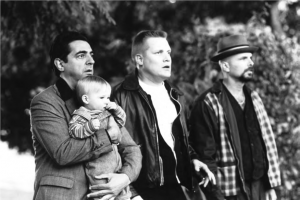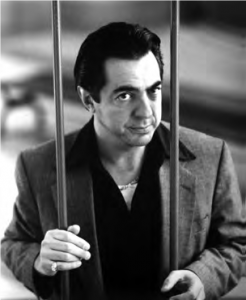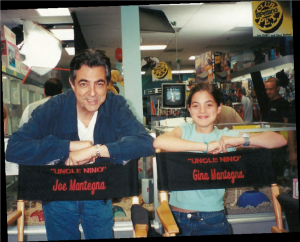There is no greater joy for a father than seeing his daughter follow him into the family business. Because of the business he’s in, Joe Mantegna is granted the added pleasure of literally watching his daughter, Gia, as she makes a name for herself on stage and screen. Every Hollywood family deals with this dynamic a little differently, of course. Yet as J.M. Stewart discovered during a leisurely meal at Taste of Chicago in Burbank, Joe and Gia handle it particularly well. If you’re one of those people who thinks that acting is an art and parenting is a job, well, this interview may change your mind. For the Mantegnas, it’s clearly the other way around.
EDGE: I would like to start by avoiding the obvious question, which goes something like, ‘Gia, what have you learned about acting from your father…’ (simultaneously)
JM: Everything. (simultaneously)
GM: Nothing. Absolutely nothing.
EDGE: Okay then. Well, in the spirit of avoiding that question, Joe, what have you learned from watching Gia?
JM: Part of what I’ve learned is that what we do is inherent. It’s just there. When I became an actor, I saw the children of actors working and wondered, What’s that about? Would they have even gotten into acting if they weren’t following their parents? I came from a background of no actors, nobody in my family was is show business at all. I thought, This can’t be genetic. It must be one of those things where the kids go, ‘Oh, my dad’s doing it so I’m going to do it.’ But then I’d see Jane and Peter Fonda, and Jeff and Beau Bridges and think, Oh, they’ve got it. As I got more into the business, I started to realize that they’re good because it’s in them. I’ve been around enough actors now to know that you can teach some things, but you’ve either got it or you don’t got it.
EDGE: Like sports.
JM: Right. You can see the kids that have the kind of natural ability they can improve upon. And then there are the kids that, well, it’s not their cup of tea. Gia does have it. I’m not kidding myself because she’s my daughter. I would be the cruelest critic of all if I felt she didn’t have that thing she can build on. I would have told her years ago, ‘I know that you think this is fun and all, but it’s not for you.’ If anything, I have to instill in her not to be like I am, not to be lazy about it.
EDGE: Lazy in what respect?
JM: I found myself thinking, I can do this, I don’t need to work on it that much. I’m not the most driven actor in the world. But I’ve gotten by and made it in spite of that.
EDGE: If you were more driven, how do you think it would have affected your career?
JM: Maybe things would have happened sooner if I had focused more attention on it. Maybe not. I don’t know. But it wasn’t me. I’ve seen other actors do that. Every day they devote twenty-four hours to How can I succeed? I was, like, If it happens, it happens. I never pushed myself to where it infringed on my life, to where I really had to sacrifice something. I enjoyed it, I wanted it to be fun. That’s my approach to a lot of things. I didn’t think, Oh my God, if I don’t make it I’ll die! I was, like, If things don’t work out, I’ll become a forest ranger.
GM: A forest ranger? Really?
JM: In reality, I probably would have been a photographer.
EDGE: Gia, what percentage of your father’s work have you seen?
GM: Five percent. I’ve seen very little because most of it was released when I was too young to watch, or it was R rated. Half the films he dies in and I was too frightened to watch. I remember flipping through the channels watching a movie, and I saw my dad walking down the street with a bouquet of flowers. I went, Yes! Dad’s on TV in something I can watch, this is so cool! A couple of minutes pass and he’s shot down with a machine gun. It affected me much more than I thought it would. I remember seeing Baby’s Day Out when I was four. We thought, Finally he did a movie that the family could watch. We’re sitting on the bed, my sister’s right next to me, and here comes the scene when the baby’s in his pants, lighting his crotch on fire.
JM: Yeah, we’re thinking it’s a great family movie. But I get beaten up by gorillas and blown up. It was a horror film to them.
GM: It was awful. I remember running out of the room crying. And dad’s hitting his face, saying, ‘Look it’s me, I’m okay. I’m here.’ So I never really sat down and watched my dad’s movies, because he was probably going to get the crap kicked out of him.
EDGE: Even now?
GM: Well, I watch Criminal Minds. But I can’t really watch it alone because it’s such a terrifying show.
EDGE: Joe, Gia has been in a couple of movies where she’s strung up and begging for her life—
GM: Apple doesn’t fall far from the tree, I guess.
EDGE: Joe, do you have the same reaction?
JM: I know the process. I’m totally familiar with it. I can disassociate. It’s disturbing, but I know what’s going on.
GM: My mom sometimes has to leave when she’s on set during those kinds of chilling scenes. She freaks out.
JM: In his book, David Mamet writes about a memorable directorial moment during House of Games. He was shooting the scene at the end when I get shot. It’s a night shoot, we’re up at Sea-Tac Airport. My wife is watching on the monitor sitting next to Dave. I get shot, and she starts crying.
GM: I never knew that.
JM: Dave was like, Wow, this is wild. She’s into it. She’s crying. She’s totally in the scene. He remembered it and put it in his book. I didn’t know about it—I was doing the scene. So, I understand that anyone can get caught up in the moment.
GM: I saw Three Amigos last night. It was pretty hilarious. I didn’t even know you were in that until I turned it on, and there you were. If I’m ever watching something that you’re in, it’s probably coincidental.
EDGE: Have you had a moment watching your father where you said, ‘Wow, that was really good?’
GM: I’m not going to lie to you. It’s very hard to watch anyone I know in a movie or on TV and be objective, or even remove myself from thinking of the technicality of the scene. I’m always thinking, How did they do that in one shot? Was there a problem with the continuity? Why did the actor make those particular choices? I’m young. I’m still learning. I’m trying to figure it out, break it down. If I analyzed everything he did, I’d drive myself crazy.
EDGE: Joe, have you ever seen Gia’s work and gone, “Wow, that was impressive?”
JM: The time I saw her in Annie. There were open auditions and my older daughter, Mia, who is autistic, was also trying out for it. They came home and said, ‘We both got in!’ My wife and I were really excited, but I have to admit that we were mostly excited about Mia, because she was going to be cast in a play. It was a big deal. I thought they both would have been cast in the chorus. We asked, ‘Who are you going to be?’ Mia says, ‘I’m going to be Pepper.’ Great! I said, ‘Gia what are you doing?’ She says, ‘I’m Annie.’ I didn’t even know she sang!
EDGE: How old were you?
GM: I was really young. We had to lie about my age. I was turning the minimum age you had to be, but I wasn’t there yet. I was ten.
JM: That’s when I first knew she had it. Based on her age and everything, you could tell. I sent the tape of the show to my old drama teacher and he said, “It was like seeing you again, Joe, when you were starting.’
EDGE: Will we hear you sing again, in a movie or on stage?
GM: Oh, no.
JM: You should. You really should.
GM: My mom thought that I was going to be a singer. But I was always terrified of the music industry because I felt like there was so much competition, and you had to pick your style and stick with it. Every five minutes I’d be changing my genre. Acting was just something that was a little more natural for me. Maybe in the future I’ll sing. My mom and dad would like that.
JM: That’s one thing I think you should really do, musical comedy. You have the talent. Why not just give it a shot? That’s what I thought I was going to end up doing, because I did so much of it when I started out. I did Hair. I did Godspell. It didn’t work out that way, but you never know.
EDGE: When did you do Hair?
JM: In 1969. It was the first professional play I did. I was naked on stage every night.
EDGE: What did your mom think of that?
JM: She came opening night. The other actors were not keen on having their parents there, so they asked me, ‘Is she cool?’ I said, ‘Yeah, yeah, she’ll get it.’ And after the play my mother comes backstage and says, ‘You look good up there naked…some of these other kids look out of shape.’ The cast couldn’t believe it. But that’s my mother. It’s all a mystery to her.
EDGE: How so?
JM: My mother just turned ninety-six and I’m still not positive she knows what I do. I asked my brother, who is eight years older than me, ‘You know all the times I was pursuing acting in high school, in junior college, and professionally, and banging around Chicago…my parents never said one word about it to me, did they say anything to you?’ He said, ‘Yeah, one time they pulled me aside and asked, What’s with your brother and this acting? Should we say something? Should we stop him?’ They were looking to him for advice. Luckily, my brother in his wisdom said, no, just leave him alone. It’s not dangerous, and if it doesn’t work out he’ll move on to something else. I think they were relieved. It’s like the sex education talk my father never gave me. I was seventeen and he came up to me and said, ‘Listen, we need to talk about sex.’ I said, ‘No… we don’t.’ He was like, Okay. Being Sicilian he was quiet anyway, but it was another burden off his shoulders.
EDGE: In the film Uncle Nino you worked together as father and daughter. Was it totally natural, or totally nervewracking?
JM: I thought it was totally natural.
GM: I thought that situation was great because it gave me the opportunity to experience a set for the first time with my dad helping me through it.
JM: It was a perfect film for her to start with. It was a feelgood movie. Bob Shellcross wrote and directed it. I loved the guy.
GM: Yeah, it was like a family.
EDGE: Gia, where would you like to be five years from now as an actress?
GM: I hope that I am doing something that makes me happy, and I hope that I can continue to stay with the choices I make for myself instead of being told what to do. At my age it’s very easy to be typecast in a certain way, and I’ve been so scared of that. I have friends who are working every day, making money, supporting themselves, but they’re not happy. I’d rather be making five amazing, little independent films, playing lots of different characters, doing something fun, instead of doing one role that you can’t break out of.
JM: She doesn’t want to be a Disney kid.
GM: Okay, dad, I didn’t want to say that.
JM: I don’t mean specifically. I mean generally. You’re put in a bag in a cookie-cutter kind of way. That’s all I’m saying.
EDGE: Okay, so here’s the big Joe Mantegna’s daughter question—
GM: O-M-G! Bring it.
EDGE: Which question about your dad are you most tired of answering?
JM: Why is he so good looking.
GM: Yeah, that one. You know I actually creep on my dad’s IMDB sometimes, and people say things like Joe Mantegna is SO hot.
JM: I better check that out.
GM: So disturbing.
Editors Note: Gia Mantegna is 21. She played Vanessa on the series Gigantic and has a lead role in the featured film Leashed, which will be released in 2012. Joe Mantegna is the star of the CBS hit Criminal Minds. He will play Bugsy Siegel in the 2012 film Kill Me, Deadly. J.M. Stewart is a freelance writer who lives north of Los Angeles. As the waiters were clearing their table, Gia said that it was nice to “sit down with my dad and talk. We don’t do that that much. We just have dinner and that’s it. Thank you.”





